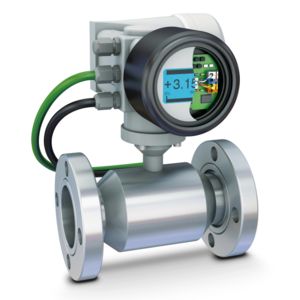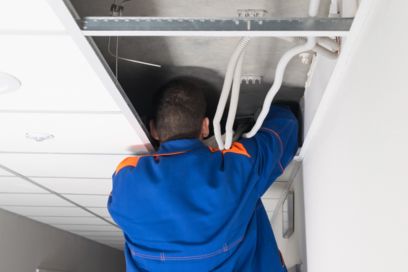
Digital 3D tour of our connection solutions in building automation
Join us as we explore a fully automated building. In the 3D tour, you will discover how the advantages of connection solutions and housings can be leveraged to your benefit.
Your advantages
- Smart networking: Device communication with suitable connections for IP-based protocols such as BACnet IP, Modbus/TCP, REST, and MQTT
- Comprehensive product portfolio: Connection technology and electronics housings for devices in building automation
- Beyond the standard: Individual designs for intelligent devices for technical building utilities
- Excellent services: Expert advice and design-in support for quick connection solutions

Networking heating, air conditioning, and ventilation technology made easy Benefit from stable connections – from the field device right through to the building management system
Growing demands on energy efficiency require sophisticated solutions for the regulation, control, and equipment of heating, ventilation, and air conditioning (HVAC) systems. As part of the technical building utilities, they have a huge influence on the functionality, efficiency, and comfort of a building. PCB connections and electronics housings from Phoenix Contact ensure the safe transmission of signals, data, and power, as well as reliable process automation.
In addition the ever-increasing networking of ventilation and air-conditioning systems, it is important that the technology does not overwhelm installers and operators. With this approach, errors can be avoided as early as during installation and easy maintenance for the operator can be ensured throughout the service life.
Solutions for heating, ventilation, and air conditioning connections

Compact PCB connections for actuating drives
Actuating drive connections Solutions for confined spaces
The compact designs of COMBICON PCB terminal blocks are particularly suited for the confined wiring spaces in actuating drives with higher degrees of protection. The advantages of compact PCB connectors in the COMBICON SPTA-THR 1,5 series at a glance:
- Tool-free, time-saving Push-in connection
- Intuitive operation with color-coded push button
- Angled connection enables multi-row arrangement on the PCB

Two-piece PCB connectors with Push-in connection technology for duct sensors
Duct sensor connections Solutions for difficult to reach devices
COMBICON PCB connectors of the PTS 1,5/..-PH-5,0 series are the ideal solution for applications that are difficult to reach. The advantages of PCB connectors with Push-in connection at a glance:
- Tool-free, time-saving Push-in connection
- Defined contact force ensures that contact remains stable over the long term
- Maximum clamping space in a small component size

PCB connectors with Push-in connection for room operating units
Connections for room operating units Solutions for two-piece housings
COMBICON PCB connectors of the PTS 1,5/..-PH-5,0 CLIP series with Push-in connection offer ideal solutions for two-piece electronics housings. The advantages at a glance:
- Ideally for two-piece electronics housings
- Tool-free, time-saving Push-in connection
- Maximum clamping space in a small component size

PCB terminal blocks for connecting window covering drives
Connections for window covering drives Solutions for more durability
With their excellent quality, SPT(A)-THR 1,5 series COMBICON PCB terminal blocks provide ideal solutions for greater durability in window covering drives. In addition to the time-saving Push-in connection, further advantages include:
- Intuitive operation with color-coded push button
- Angled connection enables multi-row arrangement on the PCB
- Designed for integration into the SMT soldering process

Board-to-board connectors for presence detectors
Connections for presence detectors More comfort in a confined space
FINEPITCH series board-to-board connectors offer smart solutions for more convenience in confined spaces in the connection area. The advantages at a glance:
- High degree of flexibility with different pitches, numbers of positions, and designs
- Positioning pins on the underside for reliable mechanical and electrical connections
- Coplanarity, tape-on-reel or magazine packaging as well as and pick-and-place pads enable automated reflow processes
References

Electronics housings for building automation
A front connection housing for smart buildings: The Neuberger Gebäudeautomation GmbH building automation specialists use the ME-IO electronics housing in the Open.Room room automation system. Together with Phoenix Contact, Neuberger has adapted the housing to the special requirements.

Modular housing concept with DIN rail connector
Functional packaging for a recording device for temperatures and energies: Scheidl GmbH uses the BC electronics housing from Phoenix Contact for its Energy Controller. The 16-pos. DIN rail connector was the key to the device design.



























